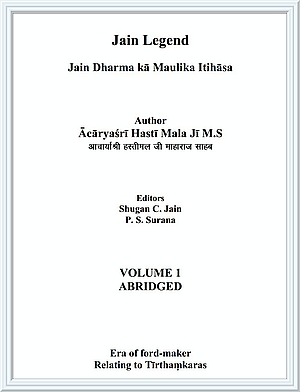After Lord Śrī Kuṃthunātha the 18thTīrthaṃkara was Lord Śrī Aranātha. In his past life Lord Aranātha, as king Dhanapati of Susīmā city in Mahāvideha, had given valuable and inspiring instructions to his subjects to live with restraint and order. After sometime the king, disinclined towards worldly affairs, accepted initiation from Saṃvaramuni and began to wander observing discipline. He obtained the Tīrthaṃkara nāmakarma from discipline and devotion to gods, preceptor and religion. In the end, dying in meditative state, he became a powerful god in the Graiveyaka.
Descending from there, his soul came into the womb of Mahādevī, queen of king Sudarśana of Hastināpura on the 2nd day of the bright fortnight of Fālguna. The queen saw the 14 auspicious dreams and was very happy. Upon completion of her pregnancy she gave birth to a son on the 10th day of the bright half of Mārgaśīrṣa under Revatī constellation. During her pregnancy the mother had seen the spoke of an invaluable bejewelled wheel hence the child was named Aranātha.
When Aranātha became a young man king Sudarśana got him married to suitable girls. After 21000 years passed the prince was crowned king. After ruling as provincial chief for 21000 years, the jewelled cakra appeared in his armouryand he started on his expedition of conquest of six khanḍs upon completion of which he became a cakravartī emperor and for the next 21000 years caused the increase of knowledge, prosperity and peace in his empire through just rule.
After his worldly life when the impact of his active and rising karma declined, then renouncing the worldly splendours he desired the life of self-discipline. Upon request by the lokāntika gods having given charities for a year, the king placed the kingdom in the hands of his son prince Aravinda and along with 1000 kings in a due procession went for initiation into monkhood. Reaching Sahasrāmravana, on the 11th day of the bright fortnight of Mārgaśīrṣa under Revatī constellation, observing fast, renouncing all bad deeds / activities, he accepted initiation formally. Soon thereafter he accrued telepathic knowledge (manaḥparyayajṅāna). On the second day he broke the fast with rice pudding at the home of king Aparājita of Rājapura city. Observing many restraints, totally giving up sleep, not lying down for three years, the Lord remained a mendicant, in contemplation. Thereafter he reached Sahasrāmravana and became meditative. On the 10th day of the bright half of the Kārtika month under Revatī constellation, in deep meditation, ascending the kṣapakaśreṇi, destroying all obscuring karmas, he attained pure intuition and knowledge. After becoming an omniscient the Lord gave a sermon in the assembly of gods and men and established the four-fold creed and became Tīrthaṃkara. Bhāvanā Arihantas are free from the 18 imperfections (doṣas) and are bearers of anantacatuṣṭayas (four infinities) and eight mahāpratihāryas (auspicious entities).
His congregation had 33 Gaṇadharas including Kuṃbhajī, and 33 gaṇas, 2800 omniscient, 2551 telepaths, 2600 clairvoyants, 610 14-pūrvadhārīs, 7300 vaikriyalabdhidhārīs, 1600 vādīs, 50000 monks, 60000 femalemonks, 184000 votaries and 372000 female votaries.
After wandering around and preaching his creed for about for 3 years less than 21 thousand years as omniscient, sensing his end-time approaching, he went to Sammetaśikhara with 1000 monks, there observed a month's fast and obtaining śaileśī daśā (14th guṇasthāna or the state which lasts as long as is necessary to pronounce five short syllables) completely destroying the four non obscuring karmas on the 10th day of the bright half of the Mārgaśīrṣa month under Revatī constellation, attained emancipation and siddha state (formless), at the age of 84000 years.
 Acharya Hasti Mala
Acharya Hasti Mala
